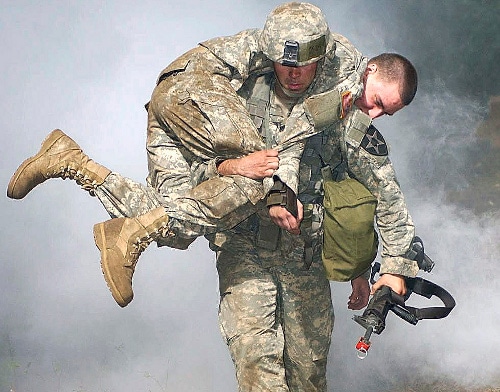
Editor’s note: This is a guest post from Chad Howse. For the last couple of months, Chad has given Art of Manliness readers a workout based on building the strength and fitness needed to tackle a heroic task. Even if you never have to step in to save the day, it’s just been a great way to focus on functional fitness and motivate yourself to get in shape. Many thanks for this awesome series, Chad!
Over the past few months we’ve gone over developing the strength and stamina that would allow each of us to be a hero if we were ever called upon to do so. Today we’re going to wrap things up by summarizing the principles behind the workouts and giving you a schedule for how to put the workouts together for a full body fitness program.
Each workout focuses on a particular skill, while at the same time providing you with a full body workout. Some workouts focus more on pulling exercises while others will incorporate some pushing exercises. All together they give you the power and explosiveness you need to pull yourself from danger, leap from rooftop to rooftop, lift an object off of someone in distress, chase down a purse snatcher, and carry someone to safety.
The lower body is a primary focus in these workouts (with the exception to The Pulling to Safety workout) because much of our power and strength starts with our legs. The key to building a solid system out of these workouts is finding the right balance. You want to be working your lower and upper body with both pushing and pulling exercises.
Challenge Workouts
One of the components of each of the workouts is something called a “challenge workout.” A challenge workout is a series of exercises that are to be completed chronologically, with minimal rest periods.
You start with the first exercise in the list and finish every one of the suggested repetitions in that exercise before moving on to the next exercise. There are no scheduled rest periods between the exercises. You should only stop when your muscles fail and you should minimize the breaks you do take, getting back to the exercise as quickly as possible.
As soon as you start that first exercise you’re also going to start the clock. Challenge workouts are timed workouts. Each time you perform a specific workout, you want to be improving your time.
This really adds competition into a program. You’ll know if you’re slacking off simply by having a look at how long it took you to complete the workout. Again, the clock doesn’t stop until the last repetition of the last exercise has been completed.
What Weights to Use
It’s hard to have guidelines for weights that everyone should be able to lift. Even if you break it into categories, there will be different levels for beginners and advanced participants.
Instead of everyone doing the same weight, for the challenge workouts choose a weight that will get you to fail 3-4 times within each exercise. You don’t want to be blasting through each workout without ever having to take a break.
Once you get a weight that is tough, and you fail 3-4 times within an exercise, keep that weight for the month. Your time should get shorter with each workout if you’re not adding weight.
For the power exercises, again, you have to be careful that you’re performing the exercise correctly to avoid injury, but to also see the benefits that you should be seeing from the exercise. You want to be choosing weights that are around the 80-90% of your maximum lift range.
For power, we’re lifting heavy, but we’re not lifting to failure. In the challenge workouts we’re lifting to failure.
The Workouts
This workout is all about speed and stamina. The first exercise–the deadlift–is about building pure, athletic power. We then go into plyometrics, which help build speed and explosiveness, followed by a challenge workout that adds muscular endurance primarily in the lower body which will help us towards the end of our chase.
This is a challenge workout that focuses almost completely on the upper body–grip and pulling exercises, as well as the core. The farmer’s walk, for instance, is a great exercise for improving both core and grip strength.
We start off with a great exercise for athletic power: cleans. This is a full-body exercise that works the legs, hips, shoulders and traps. And is great for the skill we’re developing. The rest of the workout focuses on building our lower body and shoulders, two muscle groups that we’ll need to develop to complete this heroic task.
We start this workout off by improving power with a heavy weight, low repetition exercise: deadlifts. The challenge workout focuses on building athletic power and muscular endurance for the whole body with exercises like the hack squat (quads), kettlebell swings (hips), and the military press (shoulders).
Much of what we work on–skill-wise–has to do with athletic power. As such, our workouts are packed with exercises that improve our functional strength, speed, and athleticism. This workout focuses almost entirely on plyometrics, with an Olympic-lift variation in the dumbbell snatch that improves our lower body power and explosiveness.
The Schedule
You want to be giving your body enough recovery time, so split your days up as evenly as possible.
Try using the following split which will allow enough recovery time between each workout:
Day 1 – Monday (or Sunday)
Day 2 – Wednesday (or Tuesday)
Day 3 – Friday (or Thursday)







